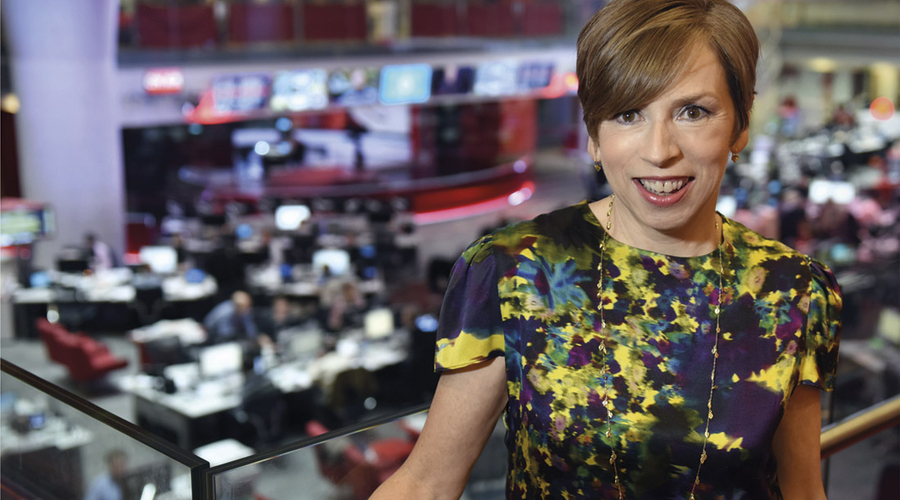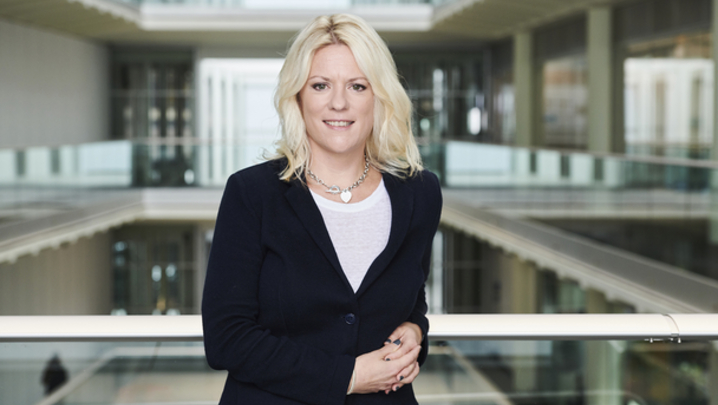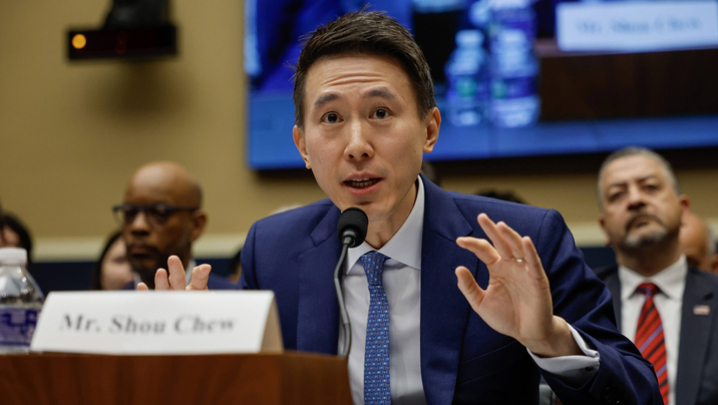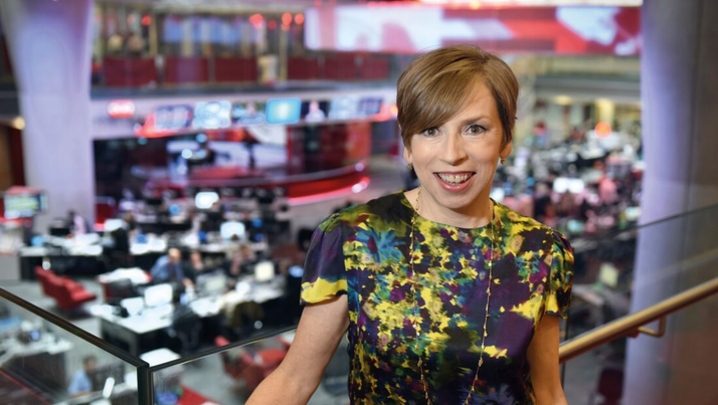Tara Conlan meets Fran Unsworth, the unflappable director of BBC News, as she prepares for further challenges
When I ask the BBC’s director of news, Fran Unsworth, if the first year in her new role has lived up to her expectations, she gives a hollow laugh.
“I always knew it was going to be a challenging job, let’s put it like that,” she admits. “But quite how challenging it turned out to be – pretty quickly into it – I possibly hadn’t anticipated.
“It was pretty tough for the first six months, truthfully – actually, for the whole of last year – dealing with some of the managerial issues over gender pay. I think we’ll get to a better place with that… it’s probably something that had to happen but, nonetheless, it was a bit bruising.
“And, then, of course – we may as well take all the difficult bits head on – [there was] the Cliff Richard trial.”
Unsworth was promoted from director of the World Service Group to her new role in January 2018. Her promotion coincided with an escalation of the gender pay row.
China editor Carrie Gracie resigned in protest over being paid less than her male colleagues. Unsworth, who was responsible for Gracie’s contract, apologised to her for “loose” language, which “led to some kind of misunderstanding”, and was forced to defend the indefensible when quizzed by MPs over BBC pay.
Six months later, Sir Cliff Richard won his privacy case against the BBC. The corporation had broken the news – using a helicopter to film it – that police were searching the singer’s Berkshire home over historical sex allegations.
At the time, Unsworth was understudy to her predecessor, James Harding. She had also been acting director of news in 2013, when Helen Boaden stepped aside during a review of the Jimmy Savile affair.
Observing previous corporation crises, such as Savile and the Hutton Inquiry, at close quarters had helped Unsworth to “build up a certain resilience”. She says this enabled her to deal with being in the glare of the public spotlight last year.
“I think that it helps to have been around a long time. I’ve been through quite a few crises in the BBC… not always at the centre of them, but I’ve seen them. Savile [was] the worst, really: when you lose the Director-General, it’s a big deal, when the grown-ups have been lopped off. It feels a bit like Brexit… everyone thinks the grown-ups have lost control. That’s very destabilising for organisations.”
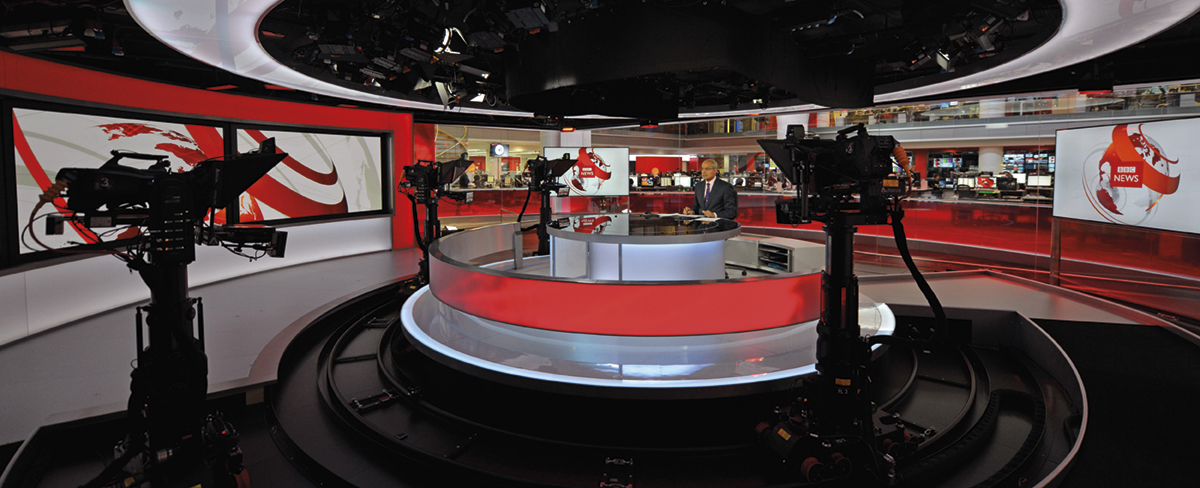
With negotiations continuing over how much the BBC will finally pay Richard (£210,000 in damages plus £850,000 agreed legal costs, and the singer is asking for more), there is a limit to what Unsworth can say but she concludes: “That was a difficult period… hopefully, most of those things are now, as they say, in the rearview mirror and we can get on with… the issues [affecting] the future of news.”
But more bruising encounters are on the horizon. Following the axing of political series This Week and the merger of Radio 4’s The World Tonight with the World Service’s Newshour (which “caused a bit of a kerfuffle”), she reveals with sadness “that this is only the start of it”. BBC News has to save £80m as part of the pan-BBC target of £800m-worth of cuts.
“We’ve done half of it; we’ve got to find another £40m,” she says. “Not all in this year, but we might do it all in this year – we’re not sure. Certainly, a big chunk of it will hit the budget by April 2020.
“I think [viewers] will see it this time. We are looking at our whole operating model: is there anything we can do… through further efficiency… [through] more sharing of material across the board? But that’s always a difficult thing to achieve in the BBC, because we’ve got a lot of services – they all like to do their own thing.
“Actually, when we look across the piece, we think we could make the material go further across outlets. We’ll have something on that by June. I think there will be further programme announcements, too, probably. We’re not sure what they are yet… none of them have been signed off.”
Brexit is all-consuming domestically – and she pays tribute to the BBC journalists covering it – but it is not expensive, as the story is mostly located in Westminster and Brussels.
“Obviously, if we get into a general election, that’s a different matter. That’s going to cost and we’ll be thinking hard, corporately, about how we’re going to fund it,” says the brightly dressed Unsworth, who tells me she originally wanted to be an actress.
Born in 1957 and from North Staffordshire, she has been at the BBC her whole career, and says, “no one’s ever asked” her to go elsewhere. “I think I’ve been invited to throw my hat in for a few things… but, actually, they’ve been abroad.”
Educated at St Dominic’s High School for Girls in Stoke-on-Trent, she studied drama at Manchester University but did not get into drama school, so worked in publishing in London.
She subsequently joined the corporation via work experience at BBC Bristol through a friend of her boss. She worked on Radio 1’s Newsbeat and Radio 4’s The World at One and PM, before becoming head of political programmes, then head of newsgathering.
As hers was not the Oxbridge-educated trainee route taken by many of her predecessors, her rise to the top was more difficult. “It took a bit longer, I think, because if you do those [trainee] schemes, you go straight into newsrooms, whereas it took me a few years to prove I was ‘worthy’ of going into a newsroom because there was a bit of, ‘Well, you’ve got no training, have you?’ But you learn on the job.”
She adds: “It has its moments, but it’s a privilege to do this job because it’s… one of the most important... in journalism.” She acknowledges that, with a salary of £340,000, “I’m paid extremely well”.
She seems remarkably unflappable. Her glass, corner office at New Broadcasting House looks out on to the newsroom. It also has a view of the road, she informs me, where a bomb disposal squad once blew up a suspect package.
The news chief uses less jargon than some of her colleagues. Her appointment to the top job was welcomed by many staff. As a former colleague says, “Fran is one of those people who just gets on with the job. She’s not one of those Oxbridge-educated men who play the game; she is extremely able and a safe pair of hands.”
Some felt she should have got the role before, when the former Times editor James Harding was appointed. However, she praises him for his focus on digital expansion.
When asked how she deals with the stresses of managing such a huge, and public, global news machine, Unsworth says simply: “Well, there’s a team and they each have their responsibility.”
She feels that it is easier to cope with a high-profile job if you have friends and family who are “quite understanding” and supportive when evenings or holidays are ruined by phone calls. She does “make spare time… I go to the theatre, I meet my friends”. She is a regular at the National Theatre and Royal Shakespeare Company and loves Alan Bennett and David Hare.
At work, she tries to chair one or two of the Monday to Friday 9:00am news meetings to keep in touch with the output. Her in-tray includes Ofcom’s current review of BBC News. This is, among other things, examining how the BBC helps people “make up their minds”.
Impartiality is a red-hot issue. Latterly, Jacob Rees-Mogg MP branded Mishal Husain’s questioning of his promotion of a video of a German far-right leader as “the Today programme’s leftie approach” (of which Unsworth says: “I think it was a fair question on Mishal’s part”). Some of her own staff took to social media to lambast Question Time’s decision to air a question about the morality of five-year-old children learning about LGBT+ issues in school.
"People are seeing us as less impartial than we used to be, so that’s a problem"
The BBC’s Charter says it should “provide duly accurate and impartial news [and] current affairs” while “championing freedom of expression”. So, is the BBC forever damned if it does and damned if it doesn’t?
“Yeah!” she says with a snort. “Our trust scores are still the highest but, nonetheless, people are seeing us as less impartial than we used to be, so that’s a problem that we feel we have to address.
“Truthfully, this might be a product of the world in which we live, a more polarised world. It is probably the case that, if people don’t see their views reflected, they assume a bias, and that’s a problem for us. We really need to get on the front foot and explain – as we do, actually – that you will hear things on the BBC that you, personally, don’t agree with.”
She adds: “We are living in quite difficult times, and… certain subjects become a kind of lightning rod. They do change a bit from week to week…there’s Brexit, then there’s transgender rights and then LGBT+ rights. It’s ‘what is the subject of the day that people feel very strongly about?’
"Our social media guidelines remind our staff what they sign up to when they join the BBC"
“But I am quite clear that we are universally funded: everyone pays, everyone has an expectation of seeing their views represented.… [However], we’re not going to give a platform to people’s views that are factually wrong without challenging them.
“Some of our own staff sometimes don’t like that… and they are saying so quite vocally, which is why I’ve seen fit to issue our social media guidelines and remind our staff what they sign up to when they join the BBC.” Those guidelines have been updated by BBC News editorial director Kamal Ahmed and were emailed recently to staff.
The gender pay issue continues to dog Unsworth. Although around 85% of equal-pay cases raised have been resolved, the Equality and Human Rights Commission said in March that it was formally investigating the BBC about the issue.
“[The gap] has come down but, of course, it was never actually that high!” she says with a rueful laugh. “There were some anomalies at the top. That was the problem.”
She concedes that she does not know if she was ever a victim of pay inequality herself. Her pay has been disclosed for around 10 years, so can be compared with male colleagues: “Prior to that… who knows?”
“One of the reasons” for the gap, she reckons, “is that local managers were making pay decisions without reference to what was going on in other divisions.
“We are disclosing people in bands so they can see more clearly where they are. I think the next phase is that they will see the male/female split.
“With these bands, now it makes it much easier to have these negotiations with people because, it’s like, that’s the deal: if you don’t like it, sorry, there’s nothing we can do.”
On the grander scale, there are positives. The BBC’s global news services’ weekly audience is 346 million and she believes the BBC is on course to hit its target of a global audience of half a billion by its centenary in 2022.
Internationally, she sees her main rivals as the other state-funded broadcasters, some of whom “don’t really have the same commitment to freedom of expression and human rights that we do”. She celebrates the impact made by Africa Eye, winner of an RTS Television Journalism Award.
Another of the BBC’s five 2019 RTS awards went to Chris Cook at Newsnight. Unsworth considers the BBC Two flagship to be “on fine form… doubling its audience” under new editor Esme Wren. She applauds the arrival of Emma Barnett at the programme: “It is great to have this array of really good strong women. It’s about appointing the best people to the job and it’s about not making assumptions, which I think were made in the past, that women somehow had less authority.
“If you look at the number of our on-air correspondents and editors, an awful lot of them are still men – and they are brilliant men. This isn’t a ‘We’re shoving out all the men’ by any means. But I think we are also recognising that there are brilliant women who are worthy of getting key jobs.”

